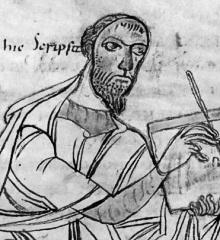He describes himself as "Eriugena" in his manuscripts, which means "Ireland-born." The "Scotus" part of his name is also how Irish or Gaels were called, so his name in full translates as "John the Irish-born Gael." (Ireland was called "Scotia Major" while Scotland was called "Scotia Minor.")
Educated in Ireland, he was invited to Aachen by Charles in 845, by which time his reputation for learning was already established. The school at Aachen flourished under him even more than under Alcuin, as it became a source not only of learning but of philosophy, which was John's strength. He was a Neoplatonist (following the ideas of some 3rd-century Greek philosophers who differed in some ways from Plato), and brought some of their ideas to Western Europe through Aachen.
The Stanford Encyclopedia of Philosophy states:
Eriugena’s thought is best understood as a sustained attempt to create a consistent, systematic, Christian Neoplatonism from diverse but primarily Christian sources. Eriugena had a unique gift for identifying the underlying intellectual framework, broadly Neoplatonic but also deeply Christian, assumed by the writers of the Christian East. [link]
Among his writings is De Divina Praedestinatione, "Concerning Divine Predestination." This was a request from Charles the Bald and Archbishop Hincmar of Reims to counter the predestinarianism of Gottschalk of Orbais, who preached that predestination was absolute in the sense that the damned were already damned since birth and free will did not apply. John wrote that God cannot predestine human freedom, people are saved or damned due to their own free will. Sin and evil are not caused by God; they are a rejection or negation of the good that comes from God, and it is the person's free will that leads them to choose not the good but its opposite.
He was thought to be the author of De Corpore et Sanguine Domini, "On the Body and Blood of the Lord," arguing that the bread and wine of the Mass were simply symbolic representations of Jesus' flesh and blood. (It was really written by Ratramnus.) Berengar of Tours later got into a lot of trouble over this idea, refuting transubstantiation.
Eriugena's De Divisione Naturae ("On the Division of Nature"), is considered his most important work, a summary and synthesis of 15 centuries of philosophy. We will tackle a basic understanding of its contents tomorrow.












